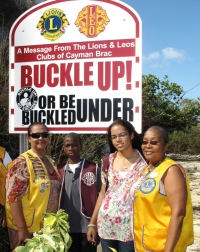Archive for March 28th, 2011

Info boss foils secrecy attempt
 (CNS): The information commissioner has found against another public body attempting to deny public access to information without genuine cause. In her ninth hearing under the FOI law Jennifer Dilbert has instructed the country’s health insurance board to release previously redacted parts of minutes of a meeting. A section of the minutes from a September CINICO board meeting had been labelled “private and confidential executive session” and the part was denied to the applicant while the rest were revealed, but the FOI boss found there was no lawful reason for any of the minutes to be withheld. In the hearing Dilbert once again found a number of procedural irregularities by the PA during the request process.
(CNS): The information commissioner has found against another public body attempting to deny public access to information without genuine cause. In her ninth hearing under the FOI law Jennifer Dilbert has instructed the country’s health insurance board to release previously redacted parts of minutes of a meeting. A section of the minutes from a September CINICO board meeting had been labelled “private and confidential executive session” and the part was denied to the applicant while the rest were revealed, but the FOI boss found there was no lawful reason for any of the minutes to be withheld. In the hearing Dilbert once again found a number of procedural irregularities by the PA during the request process.
The board had claimed that under section 20(1)(b) of the FOI Law the disclosure of the information “would, or would be likely to, inhibit the free and frank exchange of views for the purposes of deliberation”, but Dilbert noted that for this section of the law to apply the document would have to contain evidenceof free and frank discussion but she said the withheld paragraphs did not.
While the board had fought the FOI on the grounds that it must have the freedom and protection to determine the best course of action for the organisation without harmful interference, which could occur if certain information is made public, the applicant had questioned whether the board could have anything to discuss that would “override the general public interest in openness and transparency”.
Dilbert said in her ruling that she recognized the legitimate need, expressed in the FOI Law, for public authorities to “conduct candid and robust discussions, make hard choices, and conduct business in the secure knowledge that an exemption to disclosure is available where applicable”. However, quoting findings of the UK Information Commissioner in a similar case, she concluded that “for a record to have any prospect of protection under this exemption it is a prerequisite that the record must actually document a free and frank deliberation in the first place.”
She went on to point out that since the withheld “executive session” did not contain a “free and frank deliberation” such as different views, opinions, positions, arguments or recommendations of individual Board members”, but only consisted of general statements of fact and decisions, the exemption does not apply to it, and the record must be released.
While there will be times when a public authority may need to use section 20(1)(b) of the FOI Law to protect opinions and frank discussion, Dilbert noted in the report that public authorities are not at liberty to cordon off, a priori, a section of its activities or records, and post a “private and confidential” label on information in the name of protecting free and frank deliberation, effectively placing those activities or records beyond the reach of the law.
“I find that disclosure of the ‘Private and confidential Executive session’ part of the minutes of the CINICO Board meeting of 7 September 2010 would not inhibit the free and frank exchange of view for the purposes of deliberation, and that the exemption in section 20(1)(b) does not apply,” she revealed in the decision.
Deputy Information Commissioner Jan Liebaers emphasized that although the law provides a clear legal imperative towards openness, transparency and accountability for the sake of good governance not everything discussed by a board or other public authority will always need to be disclosed, but in this case the exemption does not apply.
As appears to be the case with many FOI requests, the information commissioner once again uncovered procedural weaknesses during the application process. In particular, the fact that the chief officer who would conduct an internal review was involved in the original refusal but the applicant was not informed until the Information Commissioner’s Office had been asked to hold a hearing — delaying and frustrating the requester’s access to the information.
In the first instance the information manger (IM) was the one who told the applicant they could not have access to all the minutes because of section 20 of the FOI law but the IM was acting under the instructions of CINICO’s board and its chair. According to the law this exemption is limited to the minister or chief officer concerned. When the applicant applied for an internal review the original involvement of the chief officer, who sits on the board, was not revealed until the ICO began examining the case then the procedural break downs were revealed.
Dilbert referred to another of her decisions where she had to address problems regarding the involvement of senior officials in refusals who then go on to unlawfully conduct internal reviews.
In her decision 7-01010 regarding a request by CNS to the Public Service Pension Board Dilbert had said: “It is critical that each public authority identify and designate the person who will conduct internal reviews in accordance with section 34(1) of the Law. In the interest of fairness and expediency, wherever possible, this should not be a floating responsibility that is transferred to another person if and when the designated person has already been involved in the original decision. Instead, in these circumstances applicants should be informed of their right to appeal directly to the Information Commissioner.”
She also noted that after the hearing was opened the PA raised two further exemptions in its submission, hypothetically stating that these “could” also apply. The commissioner pointed out, however, that there is no provision in the law allowing a public authority to raise potential exemptions in what she described as “a piecemeal manner, or in a hypothetical manner without any supporting evidence”, as was the case in this hearing.
“I do not encourage or condone the application of exemptions so late in the appeals process, since doing so would undermine the timeliness, credibility and fairness of the process, and would risk delaying the applicant’s fundamental right to access as established by the FOI Law,” Dilbert added.
Following the commissioner’s decision, the public authority now has 45 days to apply to the court for a judicial review otherwise it must release the minutes in full.
See the Information Commissioner’s full decision below.
Police seize firearm and ammo in George Town
(CNS): Following the report of a disturbance in the early hours of Saturday morning in George Town, officers from the RCIPS Uniform Support Group have seized a hand gun (left) and ammunition, police said Monday. On 26 March at around 2.45am officers responded to the report in the vicinity of Lawrence Boulevard, an area where there is a late night restaurant as well as two nightclubs nearby. The two men were reportedly arrested by police at the location after the revolver and bullets were seized. Both men remain in police custody but a spokesperson for the RCIPS said neither man has yet been charged with any offence relating to the weapon. The police have not yet confirmed the ages of the men who are currently being held.
Police inquiries are continuing and the RCIPS is asking witnesses to this incident to contact either the CID at George Town or to provide information anonymously and confidentially through Crime Stoppers by calling 800-8477.

Cops arrest DUI suspect after early morning smash
 (CNS): Police have arrested a man on suspicion of driving under the influence of alcohol following a crash at the North Church Street/Eastern Avenue junction in George town around 2:10 am on Monday morning. The driver and passenger were both taken to the Cayman Islands hospital after the vehicle they were in ran off the road and collided into a light pole. RCIPS officers were the first emergency services on the scene of the single car collision followed by the ambulance. However, officers from the fire service were called to assist in extricating the two occupants from the vehicle which was extensively damaged, police said. (Photo Dennie Warren Jr)
(CNS): Police have arrested a man on suspicion of driving under the influence of alcohol following a crash at the North Church Street/Eastern Avenue junction in George town around 2:10 am on Monday morning. The driver and passenger were both taken to the Cayman Islands hospital after the vehicle they were in ran off the road and collided into a light pole. RCIPS officers were the first emergency services on the scene of the single car collision followed by the ambulance. However, officers from the fire service were called to assist in extricating the two occupants from the vehicle which was extensively damaged, police said. (Photo Dennie Warren Jr)
The passenger remained in hospital for observation Monday , a police report revealed, while the driver was released before being arrested for DUI and released on police bail. Officers from traffic Management are now is investigating the collision and are asking anyone who may have witnessed the smash or have information in relation to it to contact Traffic Management at 946-6254.

Liquor board refuses longer hours for booze sales
 (CNS): Applications from local nightclubs to have their licenses extended to allow them to serve alcohol until 3am and a number of requests from bars and restaurant to extend booze sales on their licenses have all been denied. During the quarterly meeting of the Liquor Licensing Board last Thursday members heard a number of applications from various license holders to extend the hours when they can serve alcohol at weekends but all of the extension applications were refused. With a number of bars receiving extensions in recent times from 1am to 2am, nightclub ownersclaim that they are losing out on business as there is no longer an incentive for people to visit clubs when they can’t serve alcohol after 2am.
(CNS): Applications from local nightclubs to have their licenses extended to allow them to serve alcohol until 3am and a number of requests from bars and restaurant to extend booze sales on their licenses have all been denied. During the quarterly meeting of the Liquor Licensing Board last Thursday members heard a number of applications from various license holders to extend the hours when they can serve alcohol at weekends but all of the extension applications were refused. With a number of bars receiving extensions in recent times from 1am to 2am, nightclub ownersclaim that they are losing out on business as there is no longer an incentive for people to visit clubs when they can’t serve alcohol after 2am.
As a result four late night clubs made a pitch to push back their liquor sales times. Jet Nightclub, O Bar, LI Lounge and Elements Nightclub all requested permission to sell alcohol until three in the morning, extend their music playing time until 3:30 on Friday nights/ Saturday mornings, ultimately closing the clubs at 4am to return the economic advantage of being late night spots. However, all of the applications were refused as according to the law the board cannot make decisions about any liquor licenses based purely on economic consequences.
The nightclubs were not the only license premises that were disappointed in their applications to serve liquor for longer. A number of request by the holders of licenses at restaurants and bars to extend their booze serving time were also refused.
Ultra Lounge & Grill/Tropical Diner didn’t get permission to operate on Fridays until 2:00 am Saturday mornings, nor did the Corner Pocket Lounge & Billiards get the go ahead to operate on weekdays until 2:00 am the following morning. The Roof Top Lounge on Mary Street was also refused permission to operate on Fridays until 2:00 am Saturday mornings and Paradise Restaurant on the waterfront in downtown George Town was also refused a variation to allow it to operate on Thursdays and Fridays until 2:00am the following mornings. Welly’s Cool Spot and the Blue Marlin Bar also failed in their bids to be granted permission to operate on Fridays until 2:00 on Saturday mornings.
Although the license holder at Temperature Lounge & Restaurant on Shedden Road was granted Permission to operate on Thursdays until 2:00am Friday mornings, the closing time on Friday night Saturday morning was reverted to 1:00am. The licensee was also refused an application to change the license from restaurant to package.
Meanwhile, one new license was granted by the board to Luis Forbes for a Hotel Liquor License and a Music and Dancing License at the Bodden Town Beach Club, Bodden Town, Block 44B, parcels 296 and 297.
See liquor licensing minutes and board decisions below.

Alcohol Cayman’s biggest drug problem among kids
 (CNS): Despite perceptions that many of Cayman’s social problems are caused by illegal drug use, it is the misuse of alcohol that has the most negative impact on the local community, the National Drug Council director said ahead of this year’s Alcohol Awareness Month campaign. Here in Cayman, as is common around the world, the use of alcohol by teens and children is of particular concern. According to the NDC’s latest student survey results, alcohol is the number one drug of choice with local school children, with well over half of those surveyed already having tried alcohol.
(CNS): Despite perceptions that many of Cayman’s social problems are caused by illegal drug use, it is the misuse of alcohol that has the most negative impact on the local community, the National Drug Council director said ahead of this year’s Alcohol Awareness Month campaign. Here in Cayman, as is common around the world, the use of alcohol by teens and children is of particular concern. According to the NDC’s latest student survey results, alcohol is the number one drug of choice with local school children, with well over half of those surveyed already having tried alcohol.
“Many people are affected by alcoholism. Alcohol plays a leading role in many of our social problems, including crime, homelessness, teen pregnancy and domestic violence,” said Joan West Dacres, Executive Director of the National Drug Council.
All communities face a number of substance abuse issues but underage drinking continues to be among the most pervasive. The National Drug Council’s Student Drug Use Survey 2010 (CISDUS) revealed that 39% of Caymanian students surveyed reported using alcohol at least once in the year prior to the survey and 54.1% reported having at least one drink during their lifetime.
“Alcohol happens to be the most abused substance by youth in our islands. The increase
in the availability of flavoured alcoholic drinks, termed as ‘alcopops’, and the examples
of social drinking set by adults are factors that make alcohol appealing to younger
people,” said Simon Miller, Prevention Officer of the National Drug Council.
The NDC also revealed that teens engage in binge or excessive drinking, saying they binge drink at a party because they assume that a couple of drinks are harmless. Partying creates the illusion that they are having fun and alcohol enhances the fun.
Most children who use alcohol get it from a friend or family member. Nineteen percent (19.3%) of drinkers reported getting alcohol from friends, 8.9% from other relatives, and 8.5% from parents, the new survey, which will be officially released next month, shows.
As the NDC gears up to join the international campaign next month to raise awareness of alcohol abuse and encourage people to make healthy and safe choices, it said it was vital for parents to communicate the harmful effect of underage drinking.
One conversation isn’t enough to give them the information and guidance they need. Parents have the ability to influence a child’s decisions about underage drinking by simply talking often and honestly about alcohol, the experts stated.
Throughout the month of April, the National Drug Council will continue to air its series of national public service announcements and advertisements in Hollywood Theatres to get the message out. For further information on alcohol, underage drinking, and tips on talking with your child about alcohol please contact the National Drug Council at 949-9000 or visit www.ndc.ky.

Putting the cart before the horse
Rhetoric: much has been published lately with regard to the need for more immigrants to the Cayman islands to promote growth in the economy. Let’s take a brief look at the evidence in general and what ‘conventional wisdom’ has to say on the economic effects of immigration. Firstly, the House of Lords select committee 2007: "The overall conclusion from existing evidence is that immigration has a very small impact on GDP per capita."
The conclusions are in line with the findings of studies in other countries, including the USA. One complication it noted was that a large part of the way immigrants might make a country richer is because they themselves become richer.
Secondly, "The economic impact of immigration", a Citivas on-line report by the University of Cambridge, concludes: " The overall impact of immigration is small … You cannot rely on immigration to solve labour shortages. These problems can only be effectively tackled by a mobilising the under- utilisation of the talents and energies of the existing population." However, on a more positive note it concluded that "certain types of immigration, such as that of highly skilled professionals, are to the economic advantage and may have helped to create jobs for the less skilled."
This evidence is UK based so care must be taken in interpretating the findings.
Back down to earth: Economics room 101.
1. The economy of the Cayman islands can only grow with extra imported labour if it improves the GDP per head. In the current unemployment conditions this would be impossible. It’s like putting the cart before the horse. And don’t forget, more people means more heads to be divided into the GDP cake.
2. The case is sometimes made here for a larger consuming population to increase the economies of scale. This effect can only be slight because in Cayman much of this spending leaks away on imported goods and the balance of payments.
3. Another case is that un-let accommodation needs to be filled. This would be good for those investors in property caught out by the slump but in general terms the current lower rents that are a consequence can only be economically and socially advantageous for a high cost island.
Conclusions.
Cayman does not need more people. It needs more jobs, jobs that will come with the inevitable recovery in global economic conditions or from a positive impact of the recent proposed stimulation packages. At the risk of sounding pedantic, Cayman is not ready yet for more people.
More people only means more jobs when they come in response to improving economic conditions and only then, as indicated by the Civitas report, under very limited conditions, to do the specialized work that cannot be done by local Caymanians. Forget the rhetoric: emphasize that the horse’s place is in front of the cart!
Note: In this article I have deliberately not got involved in all the social and environmental costs of more people and more growth. These are likely to be even more important in the long term than the economics.

Treasury still owed duties for Ritz development
 (CNS): The developer of the Ritz Carlton-Grand Cayman still owes the public purse some $6 million in connection with duty concessions for the construction of the five-star hotel on Seven Mile Beach. Despite revelations last year by the premier that Michael Ryan would be re-starting payments to government with interest, officials have confirmed that no payments have yet been made. A re-payment proposal has reportedly been submitted to the finance ministry for consideration but it is now two years since any money was paid on the debt. So far over $3.8 million of the original $10 million has been paid but since payment stopped government coffers are now down over $2.7 million.
(CNS): The developer of the Ritz Carlton-Grand Cayman still owes the public purse some $6 million in connection with duty concessions for the construction of the five-star hotel on Seven Mile Beach. Despite revelations last year by the premier that Michael Ryan would be re-starting payments to government with interest, officials have confirmed that no payments have yet been made. A re-payment proposal has reportedly been submitted to the finance ministry for consideration but it is now two years since any money was paid on the debt. So far over $3.8 million of the original $10 million has been paid but since payment stopped government coffers are now down over $2.7 million.
It is now six months since the premier told the country’s parliament about the outstanding duty and the developer’s plans to restart payments, but the last payment received by the treasury was still the one made back in March 2009.
During the time the developer was meeting his obligations to make the quarterly payments under the previous government he paid a total of $3,825,996. When the current UDP administration was elected to office in May 2009, however, the payments stopped, with $6 milllion still outstanding from the original deferment.
McKeeva Bush revealed to his legislative colleagues in September 2010 that the owner of Stingray and Condo Co (the companies set up to develop thehotel which had received the deferment) had asked for the payment plan to be extended as a result of the difficult economic circumstances.
Answering a parliamentary question submitted by the opposition, Bush said the developer had agreed to pay interest on a new payment plan and had not requested any write-off of the amount. The premier said he did not believe the extension posed any risk that government would not receive all the money owed. He said at the time that a rate of interest had not yet been worked out or the issue discussed in Cabinet.
It is understood that since the revelations in parliament the developer has submitted a proposal but government has not yet made a decision about the payment plan. CNS contacted the developer regarding the outstanding payments but a spokesperson stated that the developer could not comment as the discussions were still ongoing.
Since government announced that the payments had stopped, Orion development (another of Ryan’s companies which is developing Dragon Bay, a proposed new resort behind the Ritz-Carlton) has made a number of redundancies.
In December more than a dozen people from the Dragon Bay office, construction and sales teams were let go, which the developer said was a result of a review of the business. A spokesperson said at the time, however, that the Dragon Bay development was still going ahead.
It was stated that the Dragon Bay development was always planned as a long term project. “We made the decision to realign and refocus our business to improve and strengthen our core capacity to move the Dragon Bay project forward,” the spokesperson stated.
Some employees who were let go claimed not to have been paid all they were due and to have been poorly treated when they were suddenly let go. CNS asked the developer about these complaints but the office said it did not comment on individual HR issues. “It was with deep regret that we had to release some of our valued employees. As per company policy we do not comment on the terms of individual employees’ engagement or termination,” a spokesperson said.
The staff also claimed that there had been no sales at the resort for more than 18 months at the time of the redundancies. However, the developer’s office denied those claims. “As a result of their exceptional location, quality and services our Residences continue to be in demand and we have seen increased activity in recent months with a number or transactions occurring and the most recent closing last week,” the developer’s office revealed last month.

Stark warnings for unsafe drivers on Cayman Brac
 (CNS): In an effort to tackle the high number of tragic deaths and other accidents on the roads of Cayman Brac, the local Lions club is mounting a campaign in the form of warning signs that they hope will hammer home the consequences of dangerous driving practices. The first, which tells drivers “Buckle Up or be Buckled Under”, has been erected opposite the Cayman Brac High School, and more signs with the slogans “You think you have skills… Speed kills”, and “Don’t drink and drive… Stay alive” will soon be appearing at strategic points on the island. Four signs make up phase one of the campaign and the Lions Club of Cayman Brac is planning to produce and mount another four signs in the next phase. (Photo by Kevin Roberts)
(CNS): In an effort to tackle the high number of tragic deaths and other accidents on the roads of Cayman Brac, the local Lions club is mounting a campaign in the form of warning signs that they hope will hammer home the consequences of dangerous driving practices. The first, which tells drivers “Buckle Up or be Buckled Under”, has been erected opposite the Cayman Brac High School, and more signs with the slogans “You think you have skills… Speed kills”, and “Don’t drink and drive… Stay alive” will soon be appearing at strategic points on the island. Four signs make up phase one of the campaign and the Lions Club of Cayman Brac is planning to produce and mount another four signs in the next phase. (Photo by Kevin Roberts)
To this end, members are appealing for support from the public for help with the additional signage, as well as other strategies to continue educating the public about the importance of safety on the roads.
“The occurrence of road traffic accidents in theCayman Islands is high and in recent times has become quite frequent on Cayman Brac. In the past we have had fatalities ranging from the young to the old,” a club spokesperson said. “We can all perhaps recall the very sad moments within the past eight years where young members of the Brac community lost their lives in road accidents and those whose lives have been significantly hampered and perhaps forever. Accidents happen for varied reasons, but it appears that speeding anddrunk driving have topped the list as main causes – ones we can prevent.”
With this in mind the Lions Club and the Leos Club of Cayman Brac decided to focus on road safety as a signature project for the year 2010-2011. Not wearing seatbelts, speeding, and drunk driving were identified by the RCIPS on Cayman Brac as the most urgent areas to be targeted.
In an attempt to increase awareness and engage young people in the project, the club launched a competition among the Cayman Brac High School students to create the slogans for the signs. An assembly was conducted at the school where students were encouraged to think about the three themes. Video clippings were shown emphasizing of the importance of road safety under the same three themes and students were invited to enter the contest. Year 9 student Joel Gayle emerged the winner of the competition with the three slogans to be used for the road signs, which club members hope will forever be etched in the minds of all passers-by.
Funds for the project were raised mainly through movie nights held by the Lions and Leos. In addition, the Leos sold roses, carnations and chocolates on Valentine’s Day and used funds from the sale to support the project. Help was also provided by PWD, Scotts Industries and MLA Moses Kirkconnell.
The project is a community effort and the Lions and Leo clubs are all about serving the community. Anyone wishing to to support them in future phases of this project can email cblions@candw.ky. Articles and photos of their ongoing projects can be found at www.braclions.blogspot.com.
“Our aim is to help reduce road accidents in our community and ultimately protect lives. We urge everyone to think before they act. The life we save could very well be our own,” the club spokesperson said.

Man jailed for road deaths
 (CNS): Alexander Callan was sentenced to four years in prison, Friday for causing the deaths of two men after a high speed crash on West Bay Road in February 2008. 21-year-old Sidney Myles of George Town and 31-year-old Bruce Lee Ebanks of West Bay were killed when Callan, who was 19 at the time and survived the smash, lost control of the car they were in and crashed into a concrete wall and a light pole after a high speed pursuit by a police patrol car near the Ritz-Carlton. Handing down the sentence following Callan’s guilty plea Justice Harrison said it was “difficult to imagine a more dangerous set of circumstances”, as he outlined the events of the night which led to the deaths of the two men. (Photo courtesy Cayman 27)
(CNS): Alexander Callan was sentenced to four years in prison, Friday for causing the deaths of two men after a high speed crash on West Bay Road in February 2008. 21-year-old Sidney Myles of George Town and 31-year-old Bruce Lee Ebanks of West Bay were killed when Callan, who was 19 at the time and survived the smash, lost control of the car they were in and crashed into a concrete wall and a light pole after a high speed pursuit by a police patrol car near the Ritz-Carlton. Handing down the sentence following Callan’s guilty plea Justice Harrison said it was “difficult to imagine a more dangerous set of circumstances”, as he outlined the events of the night which led to the deaths of the two men. (Photo courtesy Cayman 27)
Callan had driven at more than 80mph during the high speed chase with no lights, weaving in and out of traffic, and driving on the wrong side of the road before finally losing control of the car, which was split in two as a result of the impact, the court heard as the judge outlined the facts of the case.
The police pursuit had began after officers spotted the car that Callan was driving around midnight, parked off King Road outside a closed shop with no lights, no front license plate and at least two men visible inside the vehicle. The police officers approached the car but as they did it took off at speed. The pursuit then ensued, with officers putting on sirens and blue lights and alerting the 911 centre. The chase moved on to the West Bay Road, where Callan reportedly drove consistently well over 60mph at times reaching80mph on the 40mph limit road, as the police sped after the driver.
As it approached the Ritz-Carlton the car narrowly avoided colliding with another vehicle in the turning lane, but as Callan swerved he lost control of the car, hit a concrete post, then the wall and finally a light pole before the car came to rest almost in two pieces on a vacant lot. According to police radar equipment it had been travelling at around 67mph just before impact.
Callan, who also sustained serious injuries in the smash, tested negative for alcohol, but tested positive for ganja. Police could not say if Callan had used the drug prior to the crash but a small quantity was found in what was left of the car. Officers also discovered in the aftermath that Callan had a US driver’s license but no permit to drive in the Cayman Islands, his insurance coverage for the car had expired, the license coupon had expired, there was no certificate of road worthiness for the car and the plates were stolen.
The judge said the incident fell into the most serious category in relation to the offence of dangerous driving with multiple deaths and aggravating circumstances. He said Callan’s conduct was culpable in the deaths because of his dangerous driving, as he handed down the four year sentences on each count to be served concurrently and a seven year driving ban to begin once Callan was released from jail.
Reflecting on the impact statements from the mothers of the men killed, he said it was "deeply tragic” for the nearest and dearest and no matter how long the sentence the bereaved would not think it long enough as no sentence could reverse what had occurred. “Human life cannot be restored with a prison sentence,” Justice Harrison added.